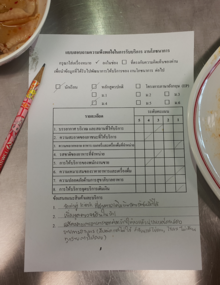Questionnaire
A questionnaire is a research instrument that consists of a set of questions (or other types of prompts) for the purpose of gathering information from respondents through survey or statistical study. A research questionnaire is typically a mix of close-ended questions and open-ended questions. Open-ended, long-term questions offer the respondent the ability to elaborate on their thoughts. The Research questionnaire was developed by the Statistical Society of London in 1838.[1][2]
Although questionnaires are often designed for statistical analysis of the responses, this is not always the case.
Questionnaires have advantages over some other types of surveys in that they are cheap, do not require as much effort from the questioner as verbal or telephone surveys, and often have standardized answers that make it simple to compile data.[3] However, such standardized answers may frustrate users as the possible answers may not accurately represent their desired responses.[4] Questionnaires are also sharply limited by the fact that respondents must be able to read the questions and respond to them. Thus, for some demographic groups conducting a survey by questionnaire may not be concretely feasible.[5]
A distinction can be made between questionnaires with questions that measure separate variables, and questionnaires with questions that are aggregated into either a scale or index. Questionnaires with questions that measure separate variables, could, for instance, include questions on:
Questionnaires with questions that are aggregated into either a scale or index include for instance questions that measure:
Usually, a questionnaire consists of a number of questions that the respondent has to answer in a set format. A distinction is made between open-ended and closed-ended questions. An open-ended question asks the respondent to formulate his own answer, whereas a closed-ended question asks the respondent to pick an answer from a given number of options. The response options for a closed-ended question should be exhaustive and mutually exclusive. Four types of response scales for closed-ended questions are distinguished:

